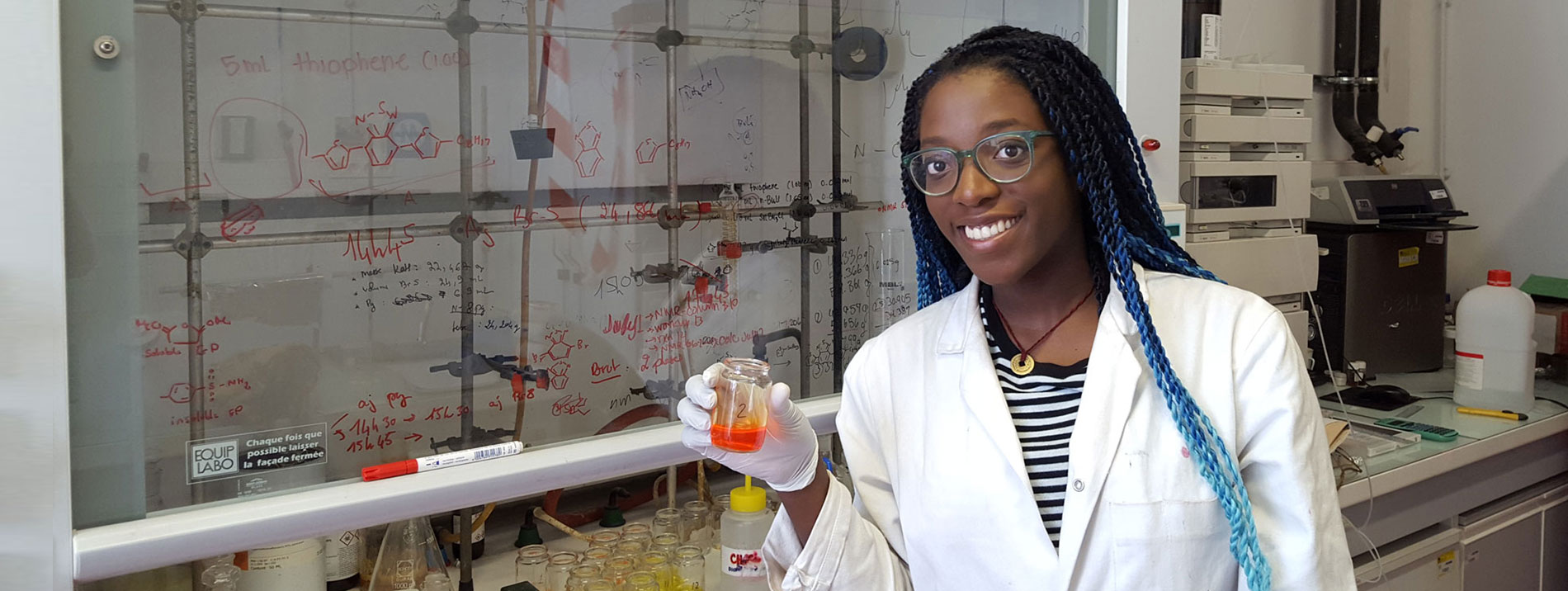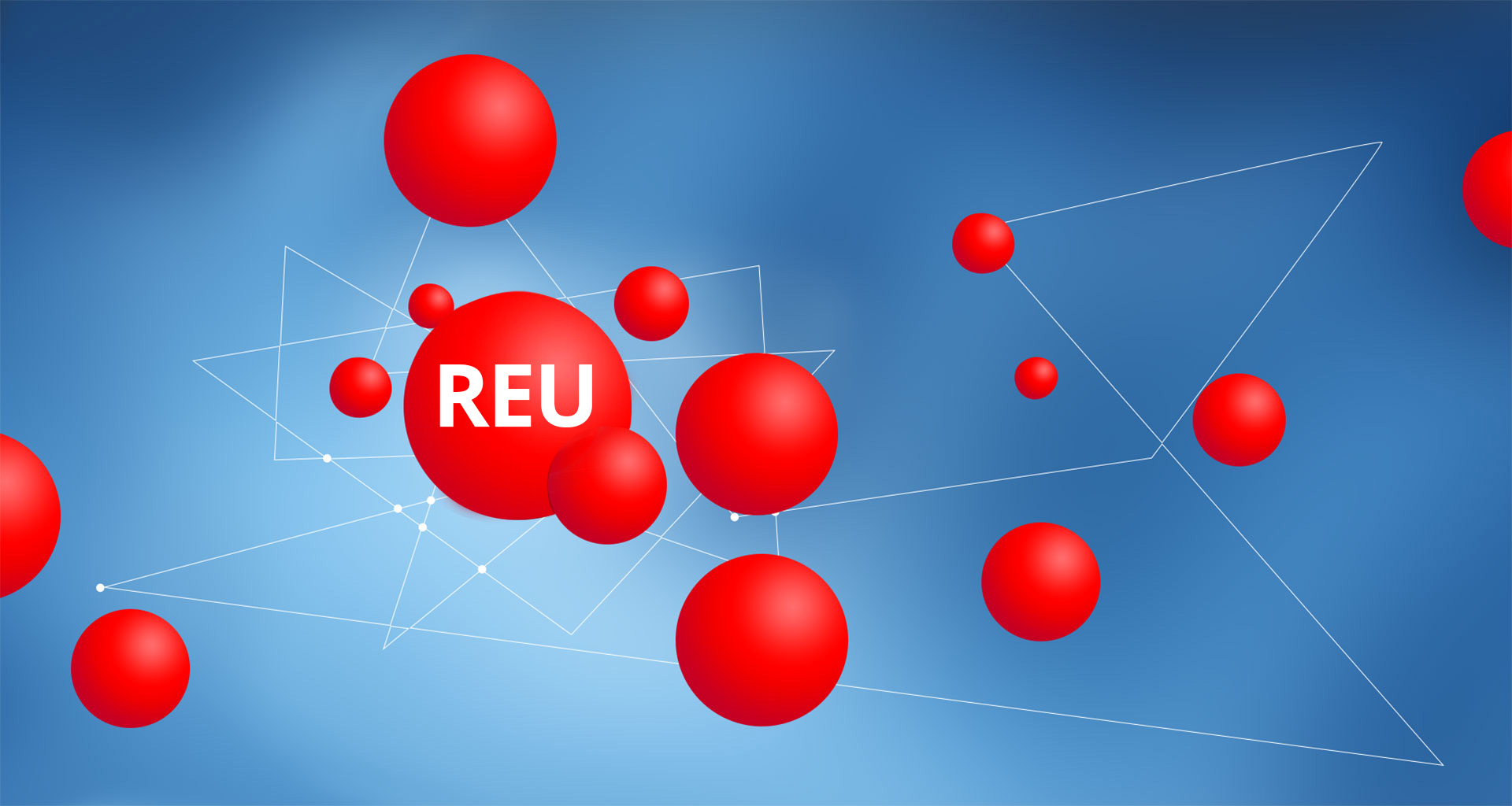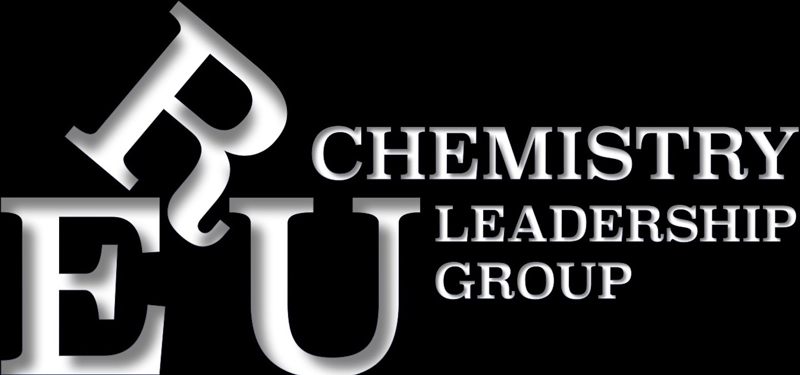
WHAT IS REU?
The Chemistry Division of the National Science Foundation (NSF) currently funds over 60 chemistry-oriented Research Experiences for Undergraduates (REU) Sites that are distributed across the United States with a few sites located in foreign countries. Each REU Site provides students with an intense 10-week research experience outside of their home institution that gives them the opportunity to fully engage in cutting-edge chemical research without other distractions, such as classes. Each Site provides student with a stipend and housing for the duration of the Program. Each REU Site offers students a “taste” of graduate school and research which, ultimately, helps students in choosing their career path. Beyond the research experience itself, students will also be engaged in professional and career development activities and cohort-building social activities.
Eligible students from any institution in the US and its associated territories can participate in chemical research at these Sites. Students from underserved populations (e.g., underrepresented minorities, students with disabilities, first-generation students, veterans, community college students, etc.) are particularly encouraged to apply. Whether students have limited opportunities to participate in research at their home institutions or they just want a research experience at another institution, the Chemistry REU Program provides the ideal venue to for the students to explore their research interests.
Student Eligibility
Undergraduate student participants must be citizens or permanent residents of the United States or its possessions.
Application Information
Students may not apply directly to NSF to participate at REU Sites. Students must apply directly to individual REU Sites as there is NO common REU application. Students can apply to multiple Sites.
Find Sites
The Chemistry Division of NSF currently funds over 60 chemistry-oriented sites spanning 16 different general research areas, distributed across the United States with a few sites located in foreign countries. For an up-to-date list of active sites with descriptions and downloadable flyers, click HERE.
WHY GET INVOLVED IN AN REU PROGRAM?
Original research takes the students on a path of discovery. Involvement of undergraduate students in research has a positive impact on student career paths, professional development and their ability to make informed choices about their future. It provides a unique opportunity for the student to receive individual mentoring from science leaders.
Science Magazine Article
WHAT IS REU?
The Chemistry Division of the National Science Foundation (NSF) currently funds over 60 chemistry-oriented Research Experiences for Undergraduates (REU) Sites that are distributed across the United States with a few sites located in foreign countries. Each REU Site provides students with an intense 10-week research experience outside of their home institution that gives them the opportunity to fully engage in cutting-edge chemical research without other distractions, such as classes. Each Site provides student with a stipend and housing for the duration of the Program. Each REU Site offers students a “taste” of graduate school and research which, ultimately, helps students in choosing their career path. Beyond the research experience itself, students will also be engaged in professional and career development activities and cohort-building social activities.
Eligible students from any institution in the US and its associated territories can participate in chemical research at these Sites. Students from underserved populations (e.g., underrepresented minorities, students with disabilities, first-generation students, veterans, community college students, etc.) are particularly encouraged to apply. Whether students have limited opportunities to participate in research at their home institutions or they just want a research experience at another institution, the Chemistry REU Program provides the ideal venue to for the students to explore their research interests.
Student Eligibility
Undergraduate student participants must be citizens or permanent residents of the United States or its possessions.
Application Information
Students may not apply directly to NSF to participate at REU Sites. Students must apply directly to individual REU Sites as there is NO common REU application. Students can apply to multiple Sites.
Find Sites
The Chemistry Division of NSF currently funds over 60 chemistry-oriented sites spanning 16 different general research areas, distributed across the United States with a few sites located in foreign countries. For an up-to-date list of active sites with descriptions and downloadable flyers, click HERE.
WHY GET INVOLVED IN AN REU PROGRAM?
Original research takes the students on a path of discovery. Involvement of undergraduate students in research has a positive impact on student career paths, professional development and their ability to make informed choices about their future. It provides a unique opportunity for the student to receive individual mentoring from science leaders.
Science Magazine Article
Frequently Asked Questions
REU stands for Research Experience for Undergraduate students. The National Science Foundation provides funding for undergraduate students to participate in research projects at multiple host institutions. The goal of the program is to provide meaningful research opportunities -outside the home institution- to students who wouldn't otherwise have them.
REU sites are institutions with NSF funding specifically awarded to host undergraduate students for research experiences. There are over 600 REU sites, spanning 16 different general research areas. The Chemistry Division of NSF currently funds over 60 chemistry-oriented sites, distributed across the United States with a few sites located in foreign countries.
Chemistry REU sites span every area of chemistry, with some sites focusing in particular sub-disciplines while others offering opportunities in any area of chemistry. A complete list of sites and their area description can be found here
Any undergraduate student who is a US citizen or permanent resident can apply to the program. Some programs are aimed a student with specific backgrounds or schools, but most programs will accept applications from students from any undergraduate institution. Some examples about potential applicants:
_ I am from a Primarily Undergraduate Institution; can I participate? YES
_ I am studying in a Community College or a 2-yr institution; can I participate? YES, while all programs accept CC students, some of them are specifically focused on this population.
_ I am graduating in May of this year, can I participate? NO. Students cannot be graduating before the summer of their application.
_ I have never done any research; can I participate? YES! The REU program is aimed at students without any prior research experience. A few sites may have required previous research (international REU sites), be sure to check their website for specific requirements
_ I am a freshman or sophomore; will I be considered? YES! Some programs are aimed at junior or upcoming senior students, but many accept applications from early-stage students.
You do not need previous research experience, but it is best if you have already taken classes in the area of research you are interested in, e.g. a chemistry or biochemistry major will be best matched in a chemistry program or one that is closely related, perhaps materials or some of the programs in biological sciences.
Usually 10 weeks, but can be adjusted in some cases to accommodate the semester/quarter system, e.g. if your home school is on semesters and the REU site is on quarters, or vice versa.
Yes! If you are accepted to a program, you will receive funds to support your travel to the site and a stipend for the summer. In most cases, housing will also be provided in dormitories or comparable facilities on or near campus.
The goal of the program is for students to focus on research and professional development. The program asks for a full time commitment, and thus no additional work is allowed. Total funding varies by site, but it is always enough to support you during the full time of the program.
The Directors of the REU program will pair up the incoming students with participating faculty members, doing their best to match research interests. When you join a research group for the summer, you will work in the area of research that the group specializes in. Most students will work on a project that is ongoing in the group in order to have the most valuable research experience in the 10-week period of the program.
You will work very closely with a faculty member and often a graduate student, postdoctoral researcher or other group member. You will be given the necessary scientific and safety training to conduct advanced level research.
Summer research is considered "full time", but work hours vary from group to group. You will also have time to explore the area the university is located in, and there are often planned group seminars, tours, and other outings.
Most sites have 8-10 students. The site organizers usually have some planned activities that will help you connect with other students from the program and from the host institution.
REU sites include professional development and cohort activities. These activities vary by institution, and sometime include seminars, visits to nearby industries, learning of tools for preparing posters and presentations and social outings.
Programs vary widely. Some will offer a formal series of workshops or seminars. Beyond that, the chance to work closely with graduate students and get to know and advisor is an important first step in your career as a scientist in any field. You will also receive valuable training in your area of research with regard to instruments and techniques specific to the field.
In many cases, REU students are co-authors on publications resulting from the experiments they conduct over the summer. In general, the project is not ready for publication until after the student has left the program. In most cases, students present a poster with their results at regional or national conferences, with support provided by the REU site. There is often a forum, such as a poster session, at the end of the summer for students to showcase their work.
Yes! Your summer research advisor will often provide you with a supportive letter of recommendation and admissions committees recognize the NSF REU as a distinction that will mark you as a good candidate. In addition, many REU programs will include workshops on how to maximize the competitiveness of your graduate school application.
Be honest with your contacts at both programs. It's OK to contact the second one and ask when you can expect to hear back. And it's OK to contact the admitted program to ask if you can have more time to make an acceptance decision, but understand that they may not be able to grant that request. In some cases, you might have to withdraw your application from one program if you accept a position. Most importantly, once you accept one position, you are obligated to attend. It reflects badly on you and creates difficulties for the REU site if you accept a position and then later back out.
Frequently Asked Questions
REU stands for Research Experience for Undergraduate students. The National Science Foundation provides funding for undergraduate students to participate in research projects at multiple host institutions. The goal of the program is to provide meaningful research opportunities -outside the home institution- to students who wouldn't otherwise have them.
REU sites are institutions with NSF funding specifically awarded to host undergraduate students for research experiences. There are over 600 REU sites, spanning 16 different general research areas. The Chemistry Division of NSF currently funds over 60 chemistry-oriented sites, distributed across the United States with a few sites located in foreign countries.
Chemistry REU sites span every area of chemistry, with some sites focusing in particular sub-disciplines while others offering opportunities in any area of chemistry. A complete list of sites and their area description can be found here
Any undergraduate student who is a US citizen or permanent resident can apply to the program. Some programs are aimed a student with specific backgrounds or schools, but most programs will accept applications from students from any undergraduate institution. Some examples about potential applicants:
_ I am from a Primarily Undergraduate Institution; can I participate? YES
_ I am studying in a Community College or a 2-yr institution; can I participate? YES, while all programs accept CC students, some of them are specifically focused on this population.
_ I am graduating in May of this year, can I participate? NO. Students cannot be graduating before the summer of their application.
_ I have never done any research; can I participate? YES! The REU program is aimed at students without any prior research experience. A few sites may have required previous research (international REU sites), be sure to check their website for specific requirements
_ I am a freshman or sophomore; will I be considered? YES! Some programs are aimed at junior or upcoming senior students, but many accept applications from early-stage students.
You do not need previous research experience, but it is best if you have already taken classes in the area of research you are interested in, e.g. a chemistry or biochemistry major will be best matched in a chemistry program or one that is closely related, perhaps materials or some of the programs in biological sciences.
Usually 10 weeks, but can be adjusted in some cases to accommodate the semester/quarter system, e.g. if your home school is on semesters and the REU site is on quarters, or vice versa.
Yes! If you are accepted to a program, you will receive funds to support your travel to the site and a stipend for the summer. In most cases, housing will also be provided in dormitories or comparable facilities on or near campus.
The goal of the program is for students to focus on research and professional development. The program asks for a full time commitment, and thus no additional work is allowed. Total funding varies by site, but it is always enough to support you during the full time of the program.
The Directors of the REU program will pair up the incoming students with participating faculty members, doing their best to match research interests. When you join a research group for the summer, you will work in the area of research that the group specializes in. Most students will work on a project that is ongoing in the group in order to have the most valuable research experience in the 10-week period of the program.
You will work very closely with a faculty member and often a graduate student, postdoctoral researcher or other group member. You will be given the necessary scientific and safety training to conduct advanced level research.
Summer research is considered "full time", but work hours vary from group to group. You will also have time to explore the area the university is located in, and there are often planned group seminars, tours, and other outings.
Most sites have 8-10 students. The site organizers usually have some planned activities that will help you connect with other students from the program and from the host institution.
REU sites include professional development and cohort activities. These activities vary by institution, and sometime include seminars, visits to nearby industries, learning of tools for preparing posters and presentations and social outings.
Programs vary widely. Some will offer a formal series of workshops or seminars. Beyond that, the chance to work closely with graduate students and get to know and advisor is an important first step in your career as a scientist in any field. You will also receive valuable training in your area of research with regard to instruments and techniques specific to the field.
In many cases, REU students are co-authors on publications resulting from the experiments they conduct over the summer. In general, the project is not ready for publication until after the student has left the program. In most cases, students present a poster with their results at regional or national conferences, with support provided by the REU site. There is often a forum, such as a poster session, at the end of the summer for students to showcase their work.
Yes! Your summer research advisor will often provide you with a supportive letter of recommendation and admissions committees recognize the NSF REU as a distinction that will mark you as a good candidate. In addition, many REU programs will include workshops on how to maximize the competitiveness of your graduate school application.
Be honest with your contacts at both programs. It's OK to contact the second one and ask when you can expect to hear back. And it's OK to contact the admitted program to ask if you can have more time to make an acceptance decision, but understand that they may not be able to grant that request. In some cases, you might have to withdraw your application from one program if you accept a position. Most importantly, once you accept one position, you are obligated to attend. It reflects badly on you and creates difficulties for the REU site if you accept a position and then later back out.

INTERESTED? LOOKING TO APPLY?
Click here to see the active REU Sites Map and Search Interface
To see a list of awarded REU Sites on the National Science Foundation site, click here.

